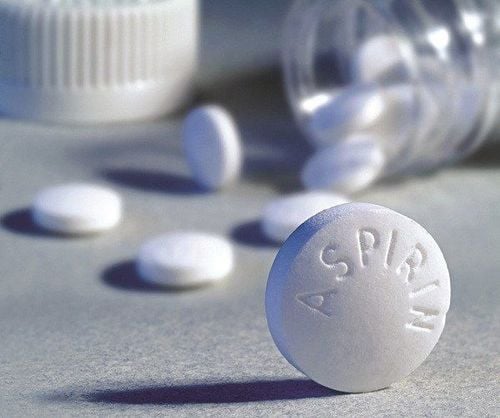This is an automatically translated article.
Caplor 75mg drug is prepared in the form of film-coated tablets, with the main ingredient being clopidogrel bisulfate. The drug has the effect of reducing thromboembolism and preventing thrombosis in patients.
1. Uses of Caplor
The main ingredient of Caplor is Clopidogrel 75mg. Clopidogrel inhibits platelet adhesion.Caplor is indicated to:
Reduce thromboembolism (myocardial infarction, stroke, vascular necrosis); Prophylaxis of thrombosis for patients with atherosclerosis who have just experienced a stroke, myocardial infarction, peripheral artery disease, ...
2. Instructions for using Caplor 75mg
How to use: Take the tablet whole with 1 glass of water, can be taken with or without food.
Dosage:
Patients with a history of atherosclerosis: Take 1 tablet 75mg/day; Prophylaxis and prevention of thromboembolic disorders such as peripheral artery disease, myocardial infarction and stroke: Take 2 tablets 75mg/day; Acute coronary syndromes (non-Q-wave myocardial infarction, unstable angina): Initial dose of 300 mg, administered as a single time. Then use the drug with a maintenance dose of 75mg/day; No dose adjustment is required in the elderly and in patients with renal impairment. Overdose: When taking Caplor 75 mg drug in overdose, patients may experience acute poisoning with manifestations including vomiting, exhaustion, shortness of breath and gastrointestinal bleeding. The treatment is based on biological principles: Platelet transfusion to rapidly reverse the pharmacological effects of clopidogrel.
Missed dose: When a dose is missed, the patient should take an additional dose as soon as he remembers. If it is almost time for the next dose, skip the missed dose and take the next dose as scheduled.
3. Side effects of Caplor 75mg
When using Caplor 75mg, patients may experience some side effects such as:
Brain hemorrhage, gastrointestinal bleeding; Thrombocytopenia, agranulocytosis; Risk of bone toxicity in patients taking clopidogrel with fever or signs of infection; Side effects on the gastrointestinal tract such as abdominal pain, indigestion, constipation, gastritis, diarrhea; Rash and skin disorders. When experiencing the above side effects, the patient should stop taking Caplor and immediately notify the doctor or go to the nearest hospital for timely examination and treatment.
4. Notes when using the drug Caplor
Contraindicated to use Caplor 75mg drug in the following cases:
Hypersensitivity to clopidogrel bisulfate or other components of the drug; Patients with advanced bleeding: cerebral hemorrhage, gastrointestinal bleeding; Breastfeeding mothers; People with severe liver failure; Children: Because of safety, efficacy has not been established. Caution when using Caplor:
Caution should be exercised when clopidogrel (a component of Caplor) is used in patients at risk of bleeding due to anatomical trauma or other pathologies. If the patient requires surgery that does not require antiplatelet agents, clopidogrel should be discontinued 7 days prior to surgery; Clopidogrel prolongs blood clotting time and can cause gastrointestinal bleeding, so it should be used with caution in patients with potentially bleeding lesions (eg, peptic ulcers). Also, caution should be exercised when administering drugs with similar side effects (aspirin and other nonsteroidal anti-inflammatory drugs) to patients taking clopidogrel; Clopidogrel should not be used in patients with severe hepatic impairment. In patients with mild to moderate hepatic impairment, caution should be exercised when using the drug; Caplor drug can cause dizziness, lightheadedness, drowsiness, so caution should be exercised when using the drug if the patient has to drive or operate machinery; Use caution when administering Caplor to pregnant or lactating mothers.
5. Caplor 75mg . drug interactions
Some drug interactions Caplor 75mg include:
Use with caution in patients who are taking drugs that increase the risk of bleeding such as: Other antiplatelet agents, anticoagulants and nonsteroidal anti-inflammatory drugs; Aspirin does not alter the inhibitory effect of clopidogrel on platelet adhesion. However, clopidogrel potentiates the effect of aspirin on collagen causing platelet adhesion. There are currently no studies on the safety of long-term combined use of these two drugs; Heparin: According to studies, clopidogrel did not affect the dose and anticoagulant effect of heparin. In addition, heparin did not affect clopidogrel's inhibitory effect on platelet adhesion. However, caution should be exercised when combining these two drugs; Non-Steroidal Anti-Inflammatory Drugs: Concomitant use of non-steroidal anti-inflammatory drugs and clopidogrel bisulfate may increase the risk of gastrointestinal bleeding, so caution should be exercised when combining these two drugs; Warfarin: The safety of the combination of clopidogrel and warfarin has not been established, so caution should be exercised when combining these two drugs; Drugs Metabolized by the Cytochrome P450 System: At high concentrations, clopidogrel inhibits Cytochrome P450 (2C9). Therefore, it may affect the metabolism of phenytoin, warfarin, torsemide, tamoxifen, tolbutamide, fluvastatin and many other non-steroidal anti-inflammatory agents,... Caution should be taken when combining clopidogrel with these drugs. To ensure that the treatment of cardiovascular diseases achieves the desired results, patients should use Caplor 75mg as prescribed by the doctor, not self-medicate. At the same time, patients need to consult their doctor about the effectiveness and safety of this drug when combining with other drugs they are using.
Follow Vinmec International General Hospital website to get more health, nutrition and beauty information to protect the health of yourself and your loved ones in your family.
Please dial HOTLINE for more information or register for an appointment HERE. Download MyVinmec app to make appointments faster and to manage your bookings easily.













